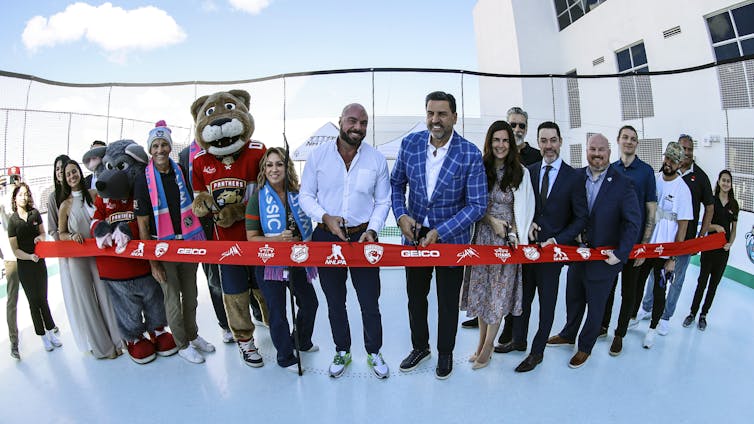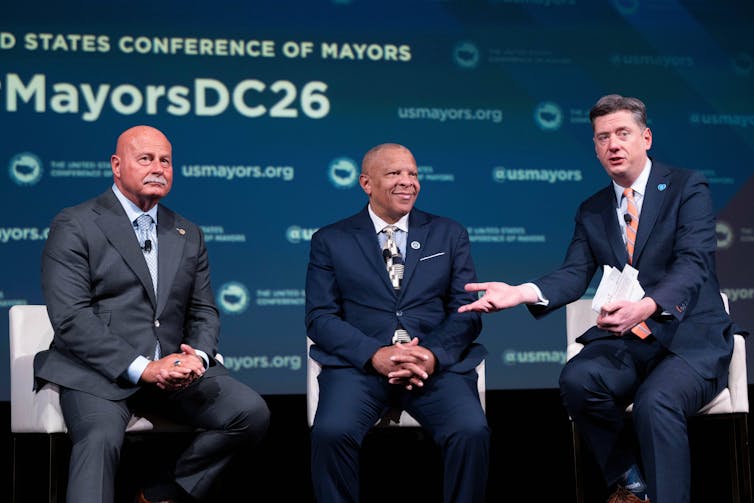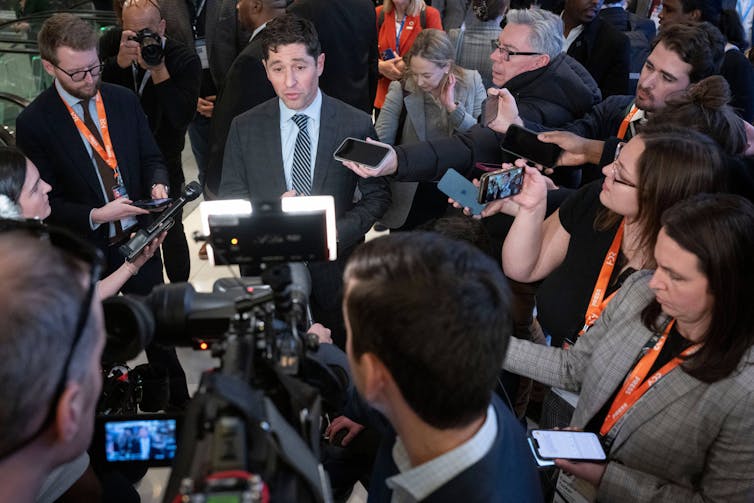News
BYRON ALLEN’S ALLEN MEDIA GROUP EXPANDS ITS BOARD OF DIRECTORS
Original Board of Directors Adds 6 New Board Members for a New Total of 9
Last Updated on March 29, 2025 by Daily News Staff
LOS ANGELES /PRNewswire/ — Byron Allen’s Allen Media Group is proud to announce that it will expand its board of directors from its original 3 board members to a new total of 9 board members. This change is effective immediately.
Allen Media was originally called Entertainment Studios when it was founded in 1993, and the original board of directors consisted of Founder/Chairman/CEO Byron Allen, Carolyn Folks, and Chief Operating Officer, Terence Hill.

In addition to the original 3 board members (Byron Allen, Carolyn Folks, and Terence Hill), Allen Media Group‘s 6 newly-added board of directors are:
- Janice Arouh
- Mark DeVitre
- Eric Gould
- Sydnie Karras
- Chris Malone
- Andy Temple
“For the past 30 years, I’ve been working with a small board of 3 directors, but now that Allen Media Group is much bigger as we’ve become highly acquisitive, I am excited to announce the addition of these 6 new board members,” said Byron Allen, Founder/Chairman/CEO of Allen Media Group. “I am extremely proud of this board because it is diverse, and the people who make it up are simply the best because they know our business and the media space innately, which allows us to move quickly and efficiently in this rapidly changing landscape.”
About Allen Media Group
Chairman and CEO Byron Allen founded Allen Media Group in 1993. Headquartered in Los Angeles, it has offices in New York, Chicago, Atlanta, and Charleston, SC. Allen Media Group owns/operates 27 ABC–NBC–CBS–FOX network affiliate broadcast television stations in 21 U.S. markets and twelve 24-hour HD television networks serving nearly 300 million subscribers: THE WEATHER CHANNEL, THE WEATHER CHANNEL EN ESPAÑOL, PETS.TV, COMEDY.TV, RECIPE.TV, CARS.TV, ES.TV, MYDESTINATION.TV, JUSTICECENTRAL.TV, THEGRIO TELEVISION NETWORK, THIS TV, and PATTRN. Allen Media Group also owns the streaming platforms HBCU GO, SPORTS.TV, THEGRIO, THE WEATHER CHANNEL EN ESPAÑOL, THE WEATHER CHANNEL STREAMING APP and LOCAL NOW–the free-streaming AVOD service powered by THE WEATHER CHANNEL and content partners, which delivers real-time, hyper-local news, weather, traffic, sports, and lifestyle information. Allen Media Group also produces, distributes, and sells advertising for 73 television programs, making it one of the largest independent producers/distributors of first-run syndicated television programming for broadcast television stations. With a library of over 5,000 hours of owned content across multiple genres, Allen Media Group provides video content to broadcast television stations, cable television networks, mobile devices, and multimedia digital. Our mission is to provide excellent content to our viewers, global platforms, and Fortune 500 advertising partners.
Allen Media Group Motion Pictures (AMGMP) is a full-service, theatrical motion picture distribution company specializing in wide release commercial content. AMGMP released 2017’s highest-grossing independent movie, the shark thriller 47 METERS DOWN, which grossed over $44.3 million. In 2018, AMGMP also released the critically acclaimed and commercially successful Western HOSTILES, the historic mystery-thriller CHAPPAQUIDDICK, and the sequel to 47 METERS DOWN, 47 METERS DOWN: UNCAGED. The digital distribution unit of Byron Allen’s Allen Media Group, Freestyle Digital Media, is a premiere multi-platform distributor with direct partnerships across all major cable, satellite, digital, and streaming platforms. Capitalizing on a robust infrastructure, proven track record, and a veteran sales team, Freestyle Digital Media is a true home for independent films. Recent releases include THE ROAD DOG starring comedian Doug Stanhope, SURVIVE starring HBO’s GAME OF THRONES star Sophie Turner and Corey Hawkins, the music documentary profiling blues guitar legends Jimmie Vaughan & Stevie Ray Vaughan, BROTHERS IN BLUES, and DEAR ZOE starring Sadie Sink from the hit Netflix series STRANGER THINGS, Jessica Capshaw and Theo Rossi. Other Freestyle Digital Media titles include BEST SUMMER EVER the teen musical featuring a fully integrated cast and crew of people with and without disabilities, produced by Jamie Lee Curtis, Maggie Gyllenhaal, Mary Steenburgen and Ted Danson, THE WEDDING YEAR starring Sarah Hyland and Anna Camp, THE LAST PHOTOGRAPH starring Danny Houston, UNTOGETHER starring Jamie Dornan, Jemima Kirke, Ben Mendelsohn, Alice Eve and Billy Crystal, the action-comedy BETTER START RUNNING starring Academy Award-winner Jeremy Irons and Maria Bello, THE BACHELORS starring Academy Award-winner J.K. Simmons, Julie Delpy and Odeya Rush and the award-winning documentary HONDROS produced by Jamie Lee Curtis and Jake Gyllenhaal.
In 2016, Allen Media Group purchased The Grio, a highly rated digital video-centric news community platform devoted to providing African Americans with compelling stories and perspectives currently underrepresented in existing national news outlets. The Grio features aggregated and original video packages, news articles and opinion pieces on topics that include breaking news, politics, health, business and entertainment. Originally launched in 2009, the platform was then purchased by NBC News in 2010. The digital platform remains focused on curating exciting digital content and currently has more than 100 million annual visitors.
For more information, visit:
www.allenmedia.tv
SOURCE Allen Media Group
Discover more from Daily News
Subscribe to get the latest posts sent to your email.
The Knowledge
Century City: From Hollywood Backlot to Business Hub
Century City, originally part of 20th Century Fox’s backlot, transformed into a prominent business district in Los Angeles during the 1950s amid the decline of cinema. Developer William Zeckendorf envisioned a mixed-use urban center, leading to iconic skyscrapers and establishing the area as a hub for law, finance, and media, blending Hollywood history with modern business.
Before Century City became one of Los Angeles’ premier business districts, it was part of 20th Century Fox’s sprawling backlot, used for filming movies and housing studio operations. By the 1950s, as television rose and movie attendance declined, 20th Century Fox faced financial challenges and decided to sell a portion of its land.

Developer William Zeckendorf envisioned a “city within a city”—a modern, mixed-use urban center with office towers, hotels, and entertainment facilities. Branded Century City, the name paid homage to its studio roots while symbolizing LA’s vision for the future.
The first skyscrapers, including the Gateway West Building, set the tone for the district’s sleek, futuristic skyline. Architects like Welton Becket and Minoru Yamasaki helped shape Century City’s iconic look. Over time, it evolved from Hollywood’s backlot to a corporate and legal hub, attracting law firms, financial institutions, and media companies.
Today, Century City stands as a testament to Los Angeles’ postwar optimism, westward expansion, and multi-centered urban growth—a unique blend of Hollywood history and modern business.
Related STM Daily News Links:
- The Evolution of Los Angeles Public Transportation
- Why Los Angeles Grew Into a Sprawling City
- Downtown Los Angeles: Past, Present, and Future
Dive into “The Knowledge,” where curiosity meets clarity. This playlist, in collaboration with STMDailyNews.com, is designed for viewers who value historical accuracy and insightful learning. Our short videos, ranging from 30 seconds to a minute and a half, make complex subjects easy to grasp in no time. Covering everything from historical events to contemporary processes and entertainment, “The Knowledge” bridges the past with the present. In a world where information is abundant yet often misused, our series aims to guide you through the noise, preserving vital knowledge and truths that shape our lives today. Perfect for curious minds eager to discover the ‘why’ and ‘how’ of everything around us. Subscribe and join in as we explore the facts that matter. https://stmdailynews.com/the-knowledge/
Discover more from Daily News
Subscribe to get the latest posts sent to your email.
Community
Local governments provide proof that polarization is not inevitable
Local politics help mitigate national polarization by focusing on concrete issues like infrastructure and community needs rather than divisive symbolic debates. A survey indicates that local officials experience less partisanship, as interpersonal connections foster recognition of shared interests. This suggests that reducing polarization is possible through collaboration and changes in election laws.

Lauren Hall, Rochester Institute of Technology
When it comes to national politics, Americans are fiercely divided across a range of issues, including gun control, election security and vaccines. It’s not new for Republicans and Democrats to be at odds over issues, but things have reached a point where even the idea of compromising appears to be anathema, making it more difficult to solve thorny problems.
But things are much less heated at the local level. A survey of more than 1,400 local officials by the Carnegie Corporation and CivicPulse found that local governments are “largely insulated from the harshest effects of polarization.” Communities with fewer than 50,000 residents proved especially resilient to partisan dysfunction.
Why this difference? As a political scientist, I believe that lessons from the local level not only open a window onto how polarization works but also the dynamics and tools that can help reduce it.
Problems are more concrete
Local governments deal with concrete issues – sometimes literally, when it comes to paving roads and fixing potholes. In general, cities and counties handle day-to-day functions, such as garbage pickup, running schools and enforcing zoning rules. Addressing tangible needs keeps local leaders’ attention fixed on specific problems that call out for specific solutions, not lengthy ideological debates.
By contrast, a lot of national political conflict in the U.S. involves symbolic issues, such as debates about identity and values on topics such as race, abortion and transgender rights. These battles are often divisive, even more so than purely ideological disagreements, because they can activate tribal differences and prove more resistant to compromise.
Such arguments at the national level, or on social media, can lead to wildly inaccurate stereotypes about people with opposing views. Today’s partisans often perceive their opponents as far more extreme than they actually are, or they may stereotype them – imagining that all Republicans are wealthy, evangelical culture warriors, for instance, or conversely being convinced that all Democrats are radical urban activists. In terms of ideology, the median members of both parties, in fact, look similar.
These kinds of misperceptions can fuel hostility.
Local officials, however, live among the human beings they represent, whose complexity defies caricature. Living and interacting in the same communities leads to greater recognition of shared interests and values, according to the Carnegie/CivicPulse survey.
Meaningful interaction with others, including partisans of the opposing party, reduces prejudice about them. Local government provides a natural space where identities overlap.
People are complicated
In national U.S. politics today, large groups of individuals are divided not only by party but a variety of other factors, including race, religion, geography and social networks. When these differences align with ideology, political disagreement can feel like an existential threat.
Such differences are not always as pronounced at the local level. A neighbor who disagrees about property taxes could be the coach of your child’s soccer team. Your fellow school board member might share your concerns about curriculum but vote differently in presidential elections.

These cross-cutting connections remind us that political opponents are not a monolithic enemy but complex individuals. When people discover they have commonalities outside of politics with others holding opposing views, polarization can decrease significantly.
Finally, most local elections are technically nonpartisan. Keeping party labels off ballots allows voters to judge candidates as individuals and not merely as Republicans or Democrats.
National implications
None of this means local politics are utopian.
Like water, polarization tends to run downhill, from the national level to local contests, particularly in major cities where candidates for mayor and other office are more likely to run as partisans. Local governments also see culture war debates, notably in the area of public school instruction.
Nevertheless, the relative partisan calm of local governance suggests that polarization is not inevitable. It emerges from specific conditions that can be altered.
Polarization might be reduced by creating more opportunities for cross-partisan collaboration around concrete problems. Philanthropists and even states might invest in local journalism that covers pragmatic governance rather than partisan conflict. More cities and counties could adopt changes in election law that would de-emphasize party labels where they add little information for voters.
Aside from structural changes, individual Americans can strive to recognize that their neighbors are not the cardboard cutouts they might imagine when thinking about “the other side.” Instead, Americans can recognize that even political opponents are navigating similar landscapes of community, personal challenges and time constraints, with often similar desires to see their roads paved and their children well educated.
The conditions shaping our interactions matter enormously. If conditions change, perhaps less partisan rancor will be the result.
Lauren Hall, Associate professor of Political Science, Rochester Institute of Technology
This article is republished from The Conversation under a Creative Commons license. Read the original article.
The Bridge is a section of the STM Daily News Blog meant for diversity, offering real news stories about bona fide community efforts to perpetuate a greater good. The purpose of The Bridge is to connect the divides that separate us, fostering understanding and empathy among different groups. By highlighting positive initiatives and inspirational actions, The Bridge aims to create a sense of unity and shared purpose. This section brings to light stories of individuals and organizations working tirelessly to promote inclusivity, equality, and mutual respect. Through these narratives, readers are encouraged to appreciate the richness of diverse perspectives and to participate actively in building stronger, more cohesive communities.
https://stmdailynews.com/the-bridge
Discover more from Daily News
Subscribe to get the latest posts sent to your email.
Making a Difference
Why Christian clergy see risk as part of their moral calling
As clergy join protests against harsh immigration enforcement, a religious ethics scholar explains why many Christian Clergy view personal risk—arrest, backlash, even violence—as part of their vocation to protect vulnerable neighbors.

Laura E. Alexander, University of Nebraska Omaha
As Christian clergy across the United States participate in ongoing protests against harsh immigration enforcement actions and further funding for U.S. Immigration and Customs Enforcement, many are still pondering the words of Rob Hirschfeld. On Jan. 18, 2026, Hirschfeld, Bishop of the Episcopal Diocese of New Hampshire, encouraged clergy in his diocese to “prepare for a new era of martyrdom” and put their wills and affairs in order.
He asserted that “it may be that now is no longer the time for statements, but for us with our bodies to stand between the powers of this world and the most vulnerable.”
Hirschfeld’s words attracted a lot of attention, with clergy generally responding positively, though at least one priest argued that he “did not sign up to be a martyr” and had a family and church relying on him.
Other clergy have willingly faced arrest for their advocacy on behalf of immigrants, seeing it as a moral calling. Rev. Karen Larson was arrested while protesting at the Minneapolis airport. She stated that when people are being separated from their families and taken to unknown detention centers, “this is our call” to protest on their behalf.
As a scholar of religious ethics, I am interested in how Christian clergy and thinkers consider personal risk when they feel called to engage in social action.
Ethics of risk
There are many examples of Christian leaders who have taken on risks out of a religious and moral obligation to provide spiritual care for people in need or advocate for oppressed communities.
Most data on the risks that clergy face in their roles as religious leaders comes from studies of religious leaders in institutional settings, such as hospitals or prisons.
Scholarship on clergy and chaplains in medical settings points to a professional obligation to take on risks. Similar to medical providers who often see risking exposure to infection as part of their professional responsibility, many clergy and chaplains in medical settings understand their vocation to include such a risk.
Questions about professional risks became particularly acute during the early years of the HIV/AIDS crisis, when researchers were uncertain exactly how the disease was spread and caregivers feared they might acquire HIV through their bedside work.
In her memoir about chaplaincy with HIV patients, Audrey Elisa Kerr notes that Riverside Church in New York continued to organize funerals, ministries and support groups for HIV/AIDS patients despite “terror” in the wider community about contagion.
As a chaplain herself, Kerr says this story of “radical hospitality” inspired her to set aside her own fears and embrace her professional role caring for people who were ill and dying.
Priests and nuns of the Catholic Church who cared for HIV/AIDS patients in the 1980s risked both the fear of contagion and the disapproval of their bishops and communities, since many of the people they cared for were men who had sex with men.
Some felt, however, that they must care for those at the margins as part of their role in the church or their monastic order. Sister Carol of the Hospital Sisters of Saint Francis felt that it was simply her moral duty as a sister to “go where she was needed,” despite potential risk.
Examination of the ethical obligations of chaplains and clergy ramped up during the COVID-19 pandemic when at least some priest, pastors and hospital chaplains felt an obligation to continue visiting patients for spiritual care.
In a reflection from 2020, Rev. David Hottinger, then working at Hennepin Healthcare in Minneapolis, noted that chaplains “felt privileged” to use their professional skills, even though they took on extra risk because they did not always have access to adequate protective equipment.
Risks in other institutional settings are not such a matter of life and death. Because of their professional preaching function, however, clergy in church settings do accept the risk of alienating church members when they feel religiously called to speak about social issues. Rev. Teri McDowell Ott has written about taking risks when discussing LGBTQ+ inclusion and starting a prison ministry.
Risk-taking during social protest
For many clergy, religious and ethical obligations extend beyond their work in institutions like churches and hospitals and include their witness in public life.
Many feel an obligation to preach on issues of moral importance, even topics that are considered controversial and might elicit strong disagreement. It is common for priests and pastors in conservative churches to include messages against legalized abortion in their sermons.
Tom Ascol of the Center for Baptist Leadership urged Baptist pastors to preach about abortion in the lead-up to the 2024 presidential election.
Rev. Leah Schade, a Lutheran minister and scholar, has argued that since 2017, mainline pastors have preached more often on issues like racism, environmental justice or gun violence. Schade says pastors are inspired to speak more bluntly about social issues because of their religious concern for people who are at risk of harm from injustice or government policies.
Some clergy view their moral obligations as going beyond preaching and leading them to on-the-ground advocacy and protest. Rev. Brandy Daniels of the Disciples of Christ denomination examines these obligations in an article on her participation in a group of interfaith clergy in Portland, Oregon. The group was convened by a local rabbi and supported protesters for racial justice in Portland in 2017. In Daniels’ analysis, clergy took on the risk of staying in the middle of protests and facing a violent police response in order to “bear moral witness,” something they were both empowered and obligated to do as religious leaders.
Risking their lives
There are more extreme cases in which clergy who challenged government leaders or policies were killed for their words and actions of protest.
In a well-known historical example, Bishop Oscar Romero, canonized as a martyred saint by the Roman Catholic Church in 2018, was assassinated in 1980 after speaking out against human rights violations against poor and Indigenous communities committed by the government of El Salvador. Romero viewed himself, in his priestly role, as a representative of God who was obliged to “give voice to the voiceless.”
During recent protests against ICE in Minneapolis and elsewhere, many clergy risked arrest and bodily harm. Rev. Kenny Callaghan, a Metropolitan Community Church pastor, who says that ICE agents in Minneapolis pointed a gun in his face and handcuffed him as he tried to help a woman they were questioning, said, “It’s in my DNA; I have to speak up for marginalized people.”
On Jan. 23, 2026, over 100 clergy were arrested at the Minneapolis-St. Paul airport as they protested and prayed against ICE actions. Rev. Mariah Furness Tollgaard said that she and others accepted being arrested as a way of demonstrating public support for migrants who are afraid to leave their homes.
In Chicago, ministers have been hit with projectiles and violently arrested. Presbyterian pastor David Black was shot in the head with a pepper spray projectile while protesting outside an immigration detention center in October 2025.
The clergy have told reporters that they feel a particular call to be out in public and to protect and support their vulnerable neighbors against ICE raids, at a time when families are afraid to go to school or work and U.S. citizens have been swept up in enforcement tactics as well.
As I see it, for these and many Christian clergy and ethicists, the call to ministry includes an obligation to express their values of care for vulnerable neighbors precisely through a public willingness to accept personal risk.
Laura E. Alexander, Associate Professor of Religious Studies, University of Nebraska Omaha
This article is republished from The Conversation under a Creative Commons license. Read the original article.
STM Daily News is a vibrant news blog dedicated to sharing the brighter side of human experiences. Emphasizing positive, uplifting stories, the site focuses on delivering inspiring, informative, and well-researched content. With a commitment to accurate, fair, and responsible journalism, STM Daily News aims to foster a community of readers passionate about positive change and engaged in meaningful conversations. Join the movement and explore stories that celebrate the positive impacts shaping our world.
Discover more from Daily News
Subscribe to get the latest posts sent to your email.
